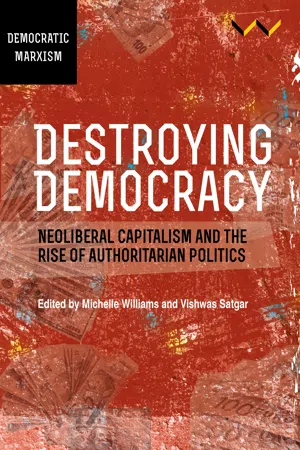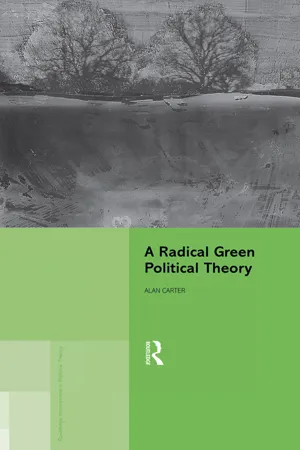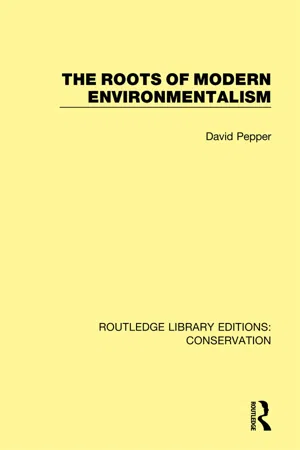Politics & International Relations
Eco Fascism
Eco-fascism is a political ideology that combines elements of environmentalism with authoritarianism and ethnonationalism. It often promotes the idea of preserving the environment through extreme measures, including population control and the exclusion of certain groups from environmental resources. Eco-fascism has been criticized for its dangerous and discriminatory implications, as it seeks to prioritize the environment at the expense of human rights and equality.
Written by Perlego with AI-assistance
Related key terms
3 Key excerpts on "Eco Fascism"
- eBook - ePub
Destroying Democracy
Neoliberal capitalism and the rise of authoritarian politics
- Jane Duncan, Linda Gordon, Gunnett Kaaf, Dale T McKinley, Alf Gunvald Nilsen, Devan Pillay, Mandla J Radebe, Alfredo Saad-Filho, Ingar Solty, Michelle Williams, Vishwas Satgar, Michelle Williams, Vishwas Satgar(Authors)
- 2021(Publication Date)
- Wits University Press(Publisher)
1944 ), the countermovement of fascism, the New Deal and Soviet planning emerged as a response to marketisation. Western-centred capitalism did not learn the lessons of market-driven economics from the late nineteenth century and how it contributed to World War I. Instead, it repeated the same mistake in the 1920s and reinstated the market-centred gold standard as the basis for international trade and finance. This led to World War II. In 2007, almost three decades of marketisation produced the worst financial crash in modern history. After massive bailouts to the US-centred financial system and Obama in the White House, it was business as usual. The poor were declared ‘big enough to fail’, homelessness shot up due to repossessions, and stabilisation and austerity policies became the norm in a volatile global financial system. Neoliberalism (as a class project of financial and transnational capital) took its next big leap from market democracies (hegemonic from 1980 to 2000 and co-optive from 2000 to 2007) in the liberal world to authoritarian market democracies in the global North and South: Trumps' USA, Poland, Turkey, Israel, Italy, Brazil (largest democracy in Latin America), Philippines, Australia and India (largest democracy in the world). Hard-right parties and movements have also broken into the mainstream in countries such as France and Germany. In Bolivia a coup in 2019 deposed a democratically elected indigenous president and US-supported destabilisation of Venezuela continues by right-wing forces.In March 2019, a mass shooter in Christchurch, New Zealand, killed 51 people and declared he was an eco-fascist. Similarly, on 28 July 2019 a man killed three people at Californias' Gilroy Garlic Festival motivated by environmental concerns, and on 3 August 2019 a gunman killed 22 people at an El Paso, Texas, Walmart and provided a link to environmentalism in his manifesto. These killings by hard-right extremists break with the climate crisis denialism of the Trump current within hard-right neoliberalism, but at the same time share a conception of migration as a problem. For these more eco-conscious fascists, population causes environmental problems and hence migrants/immigrants are objects of hate (Achenbach 2019 ; Hansman 2019 ).This idea as part of white nativist nationalism dates back in the US to the late nineteenth century, when conservationists believed that race purity was also about purity of the land, and hence Native Americans could not be part of conservation spaces. Hitler and the Nazis also had romantic conceptions of ‘blood and soil’ and romanticised the agrarian past. Their relationship to modernity was also contradictory, rejecting aspects but also embracing the technological and scientific side of it. The ‘greening of hate’ has historical roots but is also expressing itself ideologically in a new context.A new contemporary fascism is on the march in the world, different from twentieth-century fascism. It has continuities and discontinuities and sometimes expresses itself in unprecedented ways, thus posing a methodological challenge in how it is analysed. The dominant understandings of fascism in historical sociology and political science are derived from the interwar years of the twentieth century. These definitions, ideal types and models are blunt instruments to understand contemporary fascism. Instead, it is crucial to historicise and situate contemporary fascism to appreciate its specificity. The approach adopted in this chapter is based on three methodological premises (Satgar 2019 : 588–591). First, contemporary fascism can be understood not through transhistorical definitions but rather through a definitional approach that does not define fascism but situates it in relation to capitalism. This means: ‘It is a tendency within the monopoly and contemporary transnational techno-financial stages of capitalism, enabled by particular conditions of crisis and takes on an organized form as part of the struggle to achieve a monopoly on state power’ (Satgar 2019 - eBook - ePub
- Alan Carter(Author)
- 2013(Publication Date)
- Routledge(Publisher)
Hardin thus comes particularly close to eco-fascism in opposing both aid to poor countries and any immigration into the affluent nations. 5 If we are to stand up to such a serious environmental threat as many insist we currently face, and if we need to respond to it quickly, isn’t some highly authoritarian, centralized state that can enforce strict environmental policies the obvious solution? At its most attractive, eco-authoritarianism presents itself as a form of benevolent dictatorship – an environmentally benevolent dictatorship, as it were. Unfortunately, as obvious a solution as eco-authoritarianism appears to be, its flaws seem equally obvious. As with any benevolent dictatorship, how can it be guaranteed that it will remain benevolent? It is difficult to see how whatever structures empower an authoritarian, centralized leadership to exercise power effectively will, at the same time, inhibit exercises of that power which take a non-benevolent form; unless it is the people themselves who constrain such a leadership. But then, why is a leader necessary in the first place? If a leader is necessary, it must be because he or she has real power, 6 and how can its exercise be guaranteed to remain benevolent? Even if a particular leader does turn out to be genuinely benevolent, even if he or she is not corrupted by the exercise of power or the need to retain it, how can it be guaranteed that those who inherit his or her position will be equally benevolent? Hierarchical structures, by their very nature, seem to make it easy for the most competitive, most ruthless and least caring to attain power - eBook - ePub
- David Pepper(Author)
- 2019(Publication Date)
- Routledge(Publisher)
The answer is ‘both’, or ‘either’, depending on what particular group of ecocentrics you examine. There is a complete political spectrum, ranging from, for example, the Zero Population Growth movement to the Socialist Environment and Resources Association (SERA). As O’Riordan has said (1977), this range can be found in both ecocentrism and technocentrism, but by definition the former looks for radical social solutions while the latter seeks to accommodate environmental ‘problems’ within the prevailing socio-political system – either through a free-market economy approach or via gradualist liberal reforms which gently intervene in it. Therefore, on the ecocentric side the question is more stark; ecocentrism could push us towards more radical, and very left- or right-wing solutions, as Stretton (1976) has shown. The choice may be between ‘ecosocialism’ or ‘ecofascism’, by which we mean environmentalist arguments and concerns not ‘above’ or unrelated to traditional political concerns, but stemming from, and used very much as agents to advance, the interests of one traditional political side or the other. This issue has underlain much of what has been written so far. However, it may be useful now to tackle it in more head-on fashion, by examining the roots of the ecocentric’s vision of an ecologically harmonious and viable future – of, that is, the ecological Utopia, or ecotopia.7.2 ECOSOCIALISM
The first thing we can see is that ecotopian visions provide us with nothing new, in that the geography, sociology and economics of the ideal ‘ecological’ society closely match those of ideal societies which have been envisaged through history – particularly by socialist thinkers. If we look at the theory and practice (particularly in the 19th century) of such societies and the communities forming them we can see at least a certain coincidence between ecological and socialist utopias (sections 7.2.1 to 7.2.4). This will not of itself establish the extent to which ecocentrism might in future move our society towards more, rather than less, social justice and harmony between man and nature. To ascertain this we shall also need to examine the extent to which modern ecocentric ideology – that is intention – has elements of socialist ideology in it (section 7.2.5).7.2.1 Kropotkin’s Blueprint for the Future
A point-by-point examination of the programme laid out in the seminal Blueprint for Survival furnishes us with a sociology, a geography and an economics of ecotopia, which is reinforced by Schumacher (1973) and fictionalised by Callenbach (1978). At the end of the examination we could be excused for feeling surprise at the omission from Blueprint of any reference to the man from whose ideas this study is so clearly derivative; the geographer, Peter Kropotkin (1842–1921). Kropotkin pre-empted Blueprint by 73 years, publishing Fields, Factories and Workshops in 1899. This work was edited in 1974 by Colin Ward, who added the word Tomorrow to the title to indicate the degree to which Kropotkin was a man ahead of his time. On about twenty major points there is close agreement between Kropotkin and Blueprint
Index pages curate the most relevant extracts from our library of academic textbooks. They’ve been created using an in-house natural language model (NLM), each adding context and meaning to key research topics.


